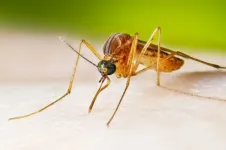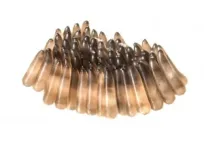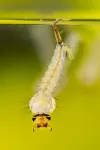(Press-News.org) New UC Riverside research makes it likely that proteins responsible for activating mosquito sperm can be shut down, preventing them from swimming to or fertilizing eggs.
The study could help control populations of Culex, the common house mosquito that transmits brain-swelling encephalitis and West Nile Virus.
“During mating, mosquitoes couple tail to tail, and the males transfer sperm into the female reproductive tract. It can be stored there awhile, but it still has to get from point A to point B to complete fertilization,” said Cathy Thaler, UCR cell biologist and the study’s first author.
Key to completing that journey are the specialized proteins secreted during ejaculation that activate the sperm flagella, or ‘tails,’ that power their movement.
“Without these proteins, the sperm cannot penetrate the eggs. They’ll remain immotile, and will eventually just degrade,” said Richard Cardullo, UCR biology professor and corresponding author of the new study.
The study, detailed in the journal PLOS ONE, details a full portrait of all the proteins in the insect’s sperm, allowing researchers to find the specific ones that maintain the quality of the sperm while they’re inactive, and that also activate them to swim.
To get this detailed information the research team worked with a team of graduate and undergraduate students who isolated as many as 200 male mosquitoes from a larger population. They then extracted enough sperm from the tiny reproductive tracts for mass spectrometry equipment to detect and identify the proteins.
Previously, the team determined that sperm need calcium upon entering a reproductive tract to power forward motion. “Now we can look in the completed protein profile we’ve created, find the calcium channel proteins, and design experiments to target these channels,” Cardullo said.
This kind of protein profiling offers a path toward controlling mosquitoes that is more environmentally friendly than other methods that can have unintended, toxic effects. “We’ve given up on spraying pesticides all over, because that kills everything, good insects and bad, and harms other animals,” Thaler said.
“Our work sets the foundation for a form of biological control, which most would agree is preferable,” Cardullo added.
The operative word is control, rather than eradicate. Even though immobilizing the sperm would be 100% effective for the treated mosquitoes, it is not possible or desirable to kill all mosquitoes. This technology would change the proportion of fertile to infertile males in a given mosquito population, rather than wiping them all out.
“Mosquitoes are the deadliest animals on Earth. But as much as people hate them, most ecologists would oppose a plan to completely eradicate them. They play an important role in the food chain for fish and other animals,” Cardullo said.
The team is hoping that information about sperm motility regulators in Culex will also apply to other species of mosquitoes. As climate change intensifies, a lot of other mosquitoes, such as those that carry malaria, are moving into the Northern Hemisphere.
Additionally, learning more about Culex sperm motility may have implications for improving fertility in humans.
Cardullo has long studied mammalian sperm, in the hopes of developing a male contraceptive. Just as important as preventing unwanted pregnancies, however, is the effort to help couples conceive. Human fertility rates have been falling for years, in part due to environmental factors. A better understanding of sperm could help overcome some of these factors.
“Many cells have flagella, or tails, including human respiratory cells as well as cells in our guts,” Cardullo said. “What we learn in one system, such as mosquitoes, can translate to others.”
END
Humans bite back by deactivating mosquito sperm
New research could help control infectious pests
2023-03-16
ELSE PRESS RELEASES FROM THIS DATE:
New findings published in AJIC highlight clinician perspectives on barriers to reliable hand hygiene
2023-03-16
Arlington, Va., March 16, 2023 – Findings from a new study published in the American Journal of Infection Control (AJIC), highlight perceptions of and barriers to reliable hand hygiene among specific clinician subgroups. The results, from the first study of its kind, provide insights that can be used to design and implement future, targeted interventions to optimize hand hygiene reliability among medical professionals.
“While prior studies focused on challenges to hand hygiene reliability by healthcare role, we believe our study is the first to highlight key differences in perceived barriers ...
Common meat-free proteins may trigger soybean and peanut allergies in some people
2023-03-16
Many people keen to reduce their meat consumption are turning to substitutes made of legumes packed with protein, vitamins, and fiber. But allergies to legumes like soy or peanuts are both common and dangerous. Are patients allergic to particular legumes at risk from meat-free proteins made of legumes even if they contain different legumes? Dr Mark Smits and a team of scientists at University Medical Center Utrecht set out to investigate.
“Both protein consumption and the world’s population are increasing which leads to an urgent demand for sustainable ...
A comprehensive circuit mapping study reveals many unexpected facts about the norepinephrine neurons in the brainstem
2023-03-16
A small nucleus in the brainstem called locus coeruleus (literally the “blue spot,”) is the primary source of a major neuromodulator, norepinephrine (NE), an important mediator of the ‘fight or flight’ response in animals. However, very little is known about the local connections of this small albeit critically important group of neurons. A recent pioneering study published in eLife from the laboratory of Dr. Xiaolong Jiang, investigator at the Jan and Dan Duncan Neurological Research Institute (Duncan NRI) ...
Maintaining heart function in donors declared ‘dead by circulatory criteria’ could improve access to heart transplantation
2023-03-16
More donated hearts could be suitable for transplantation if they are kept functioning within the body for a short time following the death of the donor, new research has concluded.
The organs are kept functioning by restarting local circulation to the heart, lungs and abdominal organs – but, crucially, not to the brain – of patients whose hearts have stopped beating for five minutes or longer and have been declared dead by circulatory criteria (donation after circulatory death, or DCD).
It is hoped that this technique could increase the number of usable donated hearts by as much as 30% in the future, helping address ...
Not enough new antibiotics in the pipeline, concludes WHO review – especially those targeting deadly drug-resistant microbes
2023-03-16
**Note: the release below is a special early release from the European Congress of Clinical Microbiology & Infectious Diseases (ECCMID 2023, Copenhagen, 15-18 April). Please credit the congress if you use this story**
Embargo – 2301H UK time Wednesday 15 March
A review from WHO on the number of new antibiotics currently in the pipeline shows that just 12 new antibiotics have entered the market in the five years from 2017-21. And there are far too few (just 27) under development in clinical trials against pathogens considered critical* by WHO such as Acinetobacter baumannii and Pseudomonas aeruginosa. ...
Short night-time sleep linked with nearly doubled risk of clogged leg arteries
2023-03-16
Sophia Antipolis, 16 March 2023: Sleeping less than five hours a night is associated with a 74% raised likelihood of developing peripheral artery disease (PAD) compared with seven to eight hours. That’s the finding of a study published today in European Heart Journal – Open, a journal of the ESC.1
“Our study suggests that sleeping for seven to eight hours a night is a good habit for lowering the risk of PAD,” said study author Dr. Shuai Yuan of the Karolinska Institute, Stockholm, ...
New global ranking for life expectancy shows decades-long UK decline
2023-03-16
A new analysis of global rankings of life expectancy over seven decades shows the UK has done worse than all G7 countries except the USA. Researchers writing in the Journal of the Royal Society of Medicine say that while UK life expectancy has increased in absolute terms over recent decades, other, similar countries are experiencing larger increases.
In 1952, when Queen Elizabeth II came to the throne, the UK had one of the longest life expectancies in the world, ranking seventh globally behind countries such as Norway, Sweden and Denmark. ...
Humans are altering the diet of Tasmanian devils, which may accelerate their decline
2023-03-16
The Tasmanian devil roams the island state of Australia as the apex predator of the land, feeding on whatever it pleases as the top dog – or the top devil. But some of these marsupial scavengers could be starting to miss out on a few items from the menu.
According to a study led by UNSW Sydney, living in human-modified landscapes could be narrowing the diet of the Tasmanian devil. The research, published recently in Scientific Reports, suggests devils have access to vastly different cuisines depending on the type of environment they live in.
“We found Tasmanian devil ...
Utah’s graphics pioneers
2023-03-16
They were a group of young, scrappy, but brilliant University of Utah computer science students and professors who changed the world.
Ed Catmull. John Warnock. Jim Clark. Alan Kay. Ivan Sutherland. Martin Newell. They are a just a handful of the luminaries in the late 1960s and 1970s who revolutionized computer graphics by inventing technologies that have aided and shaped countless industries today.
For the first time ever, these and other legends of that time will be reuniting on the U campus Thursday, March 23, and Friday March 24, to commemorate their roles as ...
Humans are not just big mice: Study identifies science’s muscle-scaling problem
2023-03-16
CHICAGO — March 16, 2023 — In science, findings generated from studying small animals often are generalized and applied to humans, which are orders of magnitude larger. New research, which was led by Shirley Ryan AbilityLab and will be published in a forthcoming issue of the Journal of Physiology, not only is the first to directly measure human muscle contractile properties; it also is the first to show that extrapolating such information to humans based on animal measurements generates incorrect predictions.
The discovery occurred initially when researchers leveraged a unique surgical technique in which a human patient’s ...
LAST 30 PRESS RELEASES:
Bureaucracy Index 2026: Business sector hit hardest
ECMWF’s portable global forecasting model OpenIFS now available for all
Yale study challenges notion that aging means decline, finds many older adults improve over time
Korean researchers enable early detection of brain disorders with a single drop of saliva!
Swipe right, but safer
Duke-NUS scientists identify more effective way to detect poultry viruses in live markets
Low-intensity treadmill exercise preconditioning mitigates post-stroke injury in mouse models
How moss helped solve a grave-robbing mystery
How much sleep do teens get? Six-seven hours.
Patients regain weight rapidly after stopping weight loss drugs – but still keep off a quarter of weight lost
GLP-1 diabetes drugs linked to reduced risk of addiction and substance-related death
Councils face industry legal threats for campaigns warning against wood burning stoves
GLP-1 medications get at the heart of addiction: study
Global trauma study highlights shared learning as interest in whole blood resurges
Almost a third of Gen Z men agree a wife should obey her husband
Trapping light on thermal photodetectors shatters speed records
New review highlights the future of tubular solid oxide fuel cells for clean energy systems
Pig farm ammonia pollution may indirectly accelerate climate warming, new study finds
Modified biochar helps compost retain nitrogen and build richer soil organic matter
First gene regulation clinical trials for epilepsy show promising results
Life-changing drug identified for children with rare epilepsy
Husker researchers collaborate to explore fear of spiders
Mayo Clinic researchers discover hidden brain map that may improve epilepsy care
NYCST announces Round 2 Awards for space technology projects
How the Dobbs decision and abortion restrictions changed where medical students apply to residency programs
Microwave frying can help lower oil content for healthier French fries
In MS, wearable sensors may help identify people at risk of worsening disability
Study: Football associated with nearly one in five brain injuries in youth sports
Machine-learning immune-system analysis study may hold clues to personalized medicine
A promising potential therapeutic strategy for Rett syndrome
[Press-News.org] Humans bite back by deactivating mosquito spermNew research could help control infectious pests


